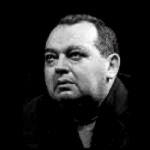In Remembrance: Leon Askin
 Leon Askin, the film actor who found his biggest fame playing Nazi
General Burkhalter in the 1960s television comedy Hoganís Heroes,
has passed away in Vienna, on Friday, June 3, 2005. He was 97.
Leon Askin, the film actor who found his biggest fame playing Nazi
General Burkhalter in the 1960s television comedy Hoganís Heroes,
has passed away in Vienna, on Friday, June 3, 2005. He was 97.
Born on September 18, 1907 in Vienna, Askin would often state that his life was primarily governed by two influences- his fatherís socialism and his motherís interest in the theatrical arts. Askin began studying acting at age 18 and soon found himself appearing in various productions around Vienna. In 1928, he went to Germany and eventually earned a place at the renowned Louise Dumont Playhouse. He remained with the company until 1933 after the Nazis took over all the theatres in Germany. For the rest of the decade, Askin alternated between living in Paris and Austria, performing in and directing stage plays in both locales. In early 1940, after a brief stay in an internment camp, Askin left France for the United States to escape further Nazi persecution.
Once in the United States, Askin worked as a stage director for two years. Following the attack on Pearl Harbor, he joined the United States Army Air Corps. During his service, he became an American citizen and shortened his last name from Aschkenasy to Askin. After the war, Askin returned to New York City where he once again became active in theatre.
Askin was approached by a talent scout for Columbia Pictures in 1952, and he soon found himself cast in the film Assignment: Paris. His first day on set almost turned into his last when he got into a disagreement with director Robert Parrish over the authorship of the story ďThe Girl with the Matchsticks.Ē Parrish insisted that it was by the Brothers Grimm, while Askin insisted that it was penned by Hans Christian Andersen. The argument was settled by the filmís star, Marta Toren, a Swede, who verified Askinís assertion. Since that fact was important to the scene being filmed, Parrish and executive producer Harry Kohn were grateful that Askin had saved the production the expense of reshooting the scene.
Although Askin spoke English well enough, he was almost exclusively cast in roles that played on his accent. He followed his Assignment: Paris role with roles in such films as the comedies Road To Bali (1952), South Sea Women (1953) and Spy Chasers (1955, with the Bowery Boys), the Biblical epic The Robe (1953), adventure films like Valley Of The Kings (1954) and Son Of Sinbad (1955) and war films like The Last Blitzkrieg (1959).
In 1960, Askin moved to Germany where he worked on several films before Billy Wilder cast him as Russian commissar Peripetchikoff for the comedy One, Two Three (1961), filming on location in Berlin. After a few more films in Germany, including the horror/thriller Das Testament Des Dr. Mabuse (1962, The Testament of Dr. Mabuse), Askin returned to Hollywood, where he landed the role of General Burkhalter on the prisoner-of-war television comedy series Hoganís Heroes. The role, which saw him frequently threatening inept POW Camp Commandant Colonel Klink with a transfer to the Russian front, would become Askinís most famous.
For nearly the next three decades Askin split his time between stage and screen, taking small roles in such films as The Wicked Dreams Of Paula Schultz (1968), Hammersmith Is Out (1972, with Elizabeth Taylor) and Airplane II: The Sequel (1982).
In 1994, Askin returned to his roots by both moving back to his native Vienna and returning to the cabaret stage. He also appeared with the Volksoper opera company. Askinís last film was the 2001 Austrian comedy Ene mene muh - und tot bist du (First You Live Then You Die). He was also awarded Viennaís Gold Medal of Honor in 2002.